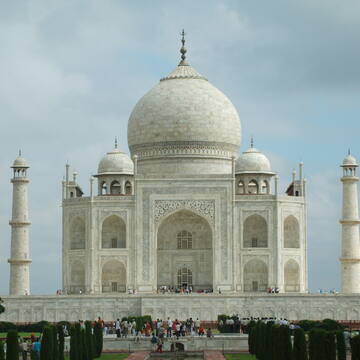Agra
History:-
Agra has a rich historical background, which is amply
evident from the numerous historical monuments in and around the city. The
earliest reference for Agra comes from the epical age, when Mahabharata refer
Agra as Agravana.
In the sources prior to this, Agra has been referred as Arya Griha or
the abode of the Aryans. The first person who referred Agra by its modern name
was Ptolemy.
It was re –designed when the Mughal Rule took over in
the 15th Century. The Mughal ruler called Sultan Sikander Lodi is the main
founder of the world famous tourist attraction called Agra. This beautiful city was founded way back in the year 1504.
Agra came to its own when Shahjahan ascended to the throne of
Mughal Empire. He marked the zenith of Mughal architecture, when he built the
Taj in memory of his beloved wife Mumtaz Mahal.
Tradition:-
Agra having inherited a rich culture and tradition
from antiquity celebrates a plethora of cultural events and festivals in a
grand manner.Dussehra, Diwali,Id and ram Barat are the major festivals
celebrated in the city with great fanfare.
Major attraction-
- The Great Taj Mahal:- World's 7th wonder. Its beauty can not be described in words, must visited placeThe Taj Mahal is located on the right bank of the Yamuna River in a vast Mughal garden that encompasses nearly 17 hectares, in the Agra District in Uttar Pradesh. It was built by Mughal Emperor Shah Jahan in memory of his wife Mumtaz Mahal with construction starting in 1632 AD and completed in 1648 AD, with the mosque, the guest house and the main gateway on the south, the outer courtyard and its cloisters were added subsequently and completed in 1653 AD. The Taj Mahal is considered to be the greatest architectural achievement in the whole range of Indo-Islamic architecture. Its recognised architectonic beauty has a rhythmic combination of solids and voids, concave and convex and light shadow; such as arches and domes further increases the aesthetic aspect.
- Fatehpur Sikri:- Place of Akbar where the world's biggest door called Buland Darwaza is situated.Built during the second half of the 16th century by the Emperor Akbar, Fatehpur Sikri (the City of Victory) was the capital of the Mughal Empire for only some 10 years. The complex of monuments and temples, all in a uniform architectural style, includes one of the largest mosques in India, the Jama Masjid.
- Agra Fort:- This structure is very famous for its intricate architectural beauty, which took 4000 workers over the span of eight years to build. This fort’s location was chosen for a strategic defense location. Since the ancient times, this fort has been a gem in the eyes of all the rulers and invaders.

